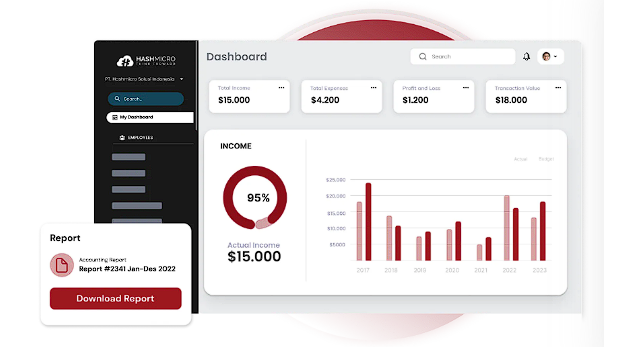We’ve seen how an ERP system for a grocery store in Singapore can greatly benefit the business by streamlining operations and increasing efficiency. With an ERP system, stores can easily manage inventory levels, track sales and purchases, and monitor employee performance. The system also provides real-time data analytics and reporting, allowing store owners to make informed decisions about inventory levels and pricing strategies.
In addition to improving day-to-day operations, an ERP system helps grocery stores comply with government regulations and standards. Singapore has strict regulations governing food safety and quality control, and an ERP system can support stores in managing these requirements more effectively. In this article, we’ll explore the key benefits of using an ERP system for grocery stores in Singapore.
Key Takeaways
|
ERP Benefits for Grocery Stores in Singapore
 Implementing an ERP system in a grocery store in Singapore can provide numerous benefits to the business. With this software, grocery stores can manage their inventory, track sales, and generate reports to gain a better understanding of their performance. You should also know the benefits, here are ERP benefits for grocery stores in Singapore:
Implementing an ERP system in a grocery store in Singapore can provide numerous benefits to the business. With this software, grocery stores can manage their inventory, track sales, and generate reports to gain a better understanding of their performance. You should also know the benefits, here are ERP benefits for grocery stores in Singapore:
Available for online and contactless shopping
With the rise of online and contactless shopping, an ERP system can significantly benefit a grocery store in Singapore. By integrating with e-commerce platforms and online marketplaces, an ERP system can help the store manage and fulfill online orders more efficiently. The system can track inventory levels, manage order fulfillment, and provide real-time updates to customers on the status of their orders.
Automatic warehouse management
An ERP system with automatic warehouse management capabilities can greatly benefit a grocery store in Singapore. Automating inventory management with inventory software in the store’s warehouse can reduce errors and improve efficiency. The system can track inventory levels in real time, automatically reorder products when inventory runs low, and optimize storage space to minimize waste and reduce costs.
Integrated system
An integrated ERP system can provide significant benefits to grocery stores in Singapore. With an ERP system, grocery stores can centralize their inventory management and improve customer service. The system can help store owners track their inventory levels in real-time, allowing them to optimize their stock and reduce waste. It can also help them manage their procurement and logistics more efficiently to cost savings and improve inventory turnover.
Monitor all outlets
Monitoring all outlets of an ERP system can bring additional benefits to grocery stores in Singapore. By having a comprehensive view of their operations across all outlets, store owners can identify areas of improvement and make data-driven decisions to optimize their performance. With an ERP system, they can monitor each outlet’s sales, inventory, and other key metrics in real time, enabling them to identify issues and resolve them quickly.
Real-time reporting
Real-time reporting of ERP system benefits in grocery stores in Singapore can be significant. An ERP system can report key performance indicators such as sales, inventory, and customer data across all outlets. This information can be accessed by store owners and managers from anywhere, allowing them to make timely and informed decisions.
Read more: What Is Retail Software? Types & 15 Best Solutions in 2025
ERP Recommendation for Grocery Store in Singapore
 ERP systems have become essential for modern businesses to efficiently manage their operations, especially in the highly competitive retail industry. Implementing an ERP system for grocery stores in Singapore can streamline their business processes and provide real-time insights into their operations. Here are some ERP recommendations for grocery stores in Singapore:
ERP systems have become essential for modern businesses to efficiently manage their operations, especially in the highly competitive retail industry. Implementing an ERP system for grocery stores in Singapore can streamline their business processes and provide real-time insights into their operations. Here are some ERP recommendations for grocery stores in Singapore:
1. HashMicro
ERP HashMicro is a highly recommended software for grocery stores in Singapore that offers a range of features to streamline business processes. The software is designed to improve operational efficiency and increase productivity, providing grocery store owners valuable insights into their business operations.
Using ERP HashMicro for grocery stores is its ability to integrate with various systems such as point-of-sale. This integration streamlines operations and reduces the risk of errors and inconsistencies in data management. Moreover, the software’s easy-to-use interface and user-friendly features make it accessible for grocery store owners with little to no technical expertise.
As one of the top ERP providers in Southeast Asia, HashMicro has served over 2,000 clients, including Forbes Asia and Bank of China.
Features:
- Built-in BI (Business Intelligence): Advanced analytics, real-time insights, and customizable dashboards for smarter decisions.
- Mobile Apps: Access ERP anytime, boosting productivity and responsiveness.
- WhatsApp Integration: Streamlined communication and improved customer engagement.
- Access-Level: Role-based permissions to secure data and prevent unauthorized access.
- AI-Generated Report & Explainer: Automated, accurate reports to support strategic planning.
- Flexible Hosting Methods: Choose cloud, on-premise, or hybrid based on business needs.
- Multi-Language: Operate seamlessly across diverse languages for global operations.
2. Netsuite
NetSuite is a cloud-based ERP software that provides businesses with a comprehensive suite of applications to manage their operations. It is designed to streamline business processes and improve operational efficiency. However, one of the disadvantages of NetSuite is its steep learning curve. Due to its extensive functionality and customization options, users may need time to understand how to use the software effectively and fully.
3. Eazy ERP
Eazy ERP is designed to simplify business processes and improve operational efficiency by integrating various business functions into a single platform. However, one of the disadvantages of Eazy ERP is its limited functionality compared to other ERP software solutions. While it offers many essential features, it may not suit businesses with complex or unique requirements.
4. Lightspeed
Lightspeed is a popular choice for retail, restaurant, and hospitality businesses, as it is user-friendly and easily customizable to meet specific business needs. However, one of the disadvantages of Lightspeed is its pricing. While it offers many essential features, it can be quite expensive compared to other POS software solutions, particularly for businesses with larger inventories or multiple locations.
Conclusion
In conclusion, the ERP system in Singapore’s grocery industry can bring many benefits to businesses. An ERP system can help grocery businesses streamline their operations, reduce costs, and improve their overall efficiency by integrating various business functions such as inventory management, purchasing, and sales.
However, it is important to note that implementing an ERP system can also come with challenges. Businesses must carefully evaluate their needs and choose an ERP system suitable for their requirements, such as HashMicro ERP software. Finally, businesses must be prepared for the financial and time investment required to implement an ERP system. Try out our free demo and use our product!
FAQ about Grocery Store in Singapore
-
Can ERP systems in grocery stores help with supplier relationship management?
Yes, ERP systems track supplier performance, manage orders, and improve communication for better delivery and pricing terms.
-
Is it possible to customize an ERP system for unique grocery business needs?
Yes, ERP systems can be customized to fit specific workflows, local POS integrations, and regulatory requirements.
-
How does ERP software support seasonal demand forecasting for grocery stores?
It analyzes past sales data to predict demand spikes, helping you plan inventory and avoid overstock or shortages.
-
What role does ERP play in reducing food waste in grocery stores?
ERP tracks expiration dates and stock movement, helping stores sell perishables on time and reduce spoilage.
-
Can an ERP system help with employee scheduling and productivity in grocery stores?
Yes, ERP can manage schedules and track staff performance to align manpower with store traffic.



































